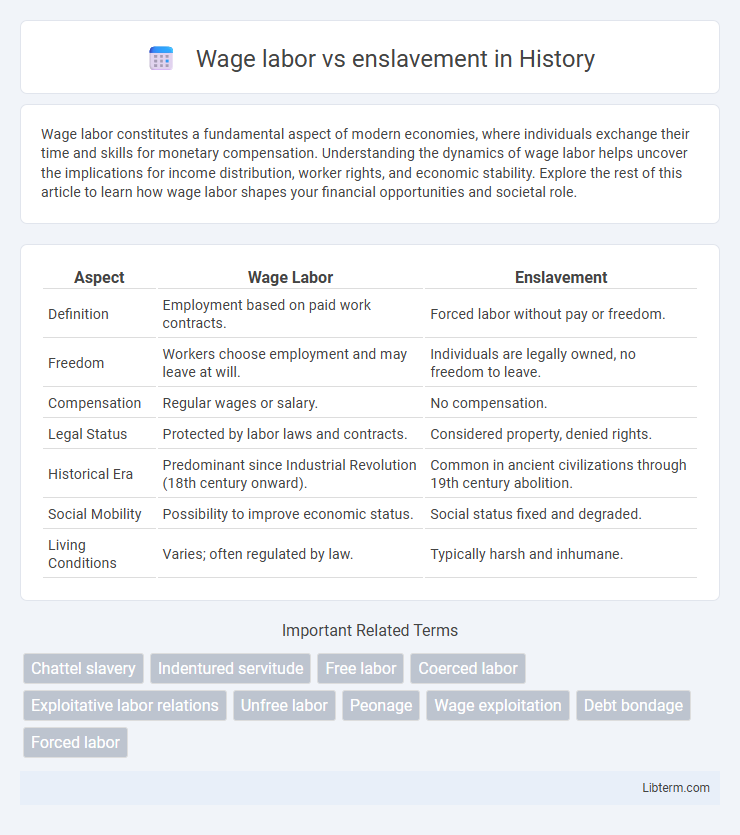Wage labor constitutes a fundamental aspect of modern economies, where individuals exchange their time and skills for monetary compensation. Understanding the dynamics of wage labor helps uncover the implications for income distribution, worker rights, and economic stability. Explore the rest of this article to learn how wage labor shapes your financial opportunities and societal role.
Table of Comparison
| Aspect | Wage Labor | Enslavement |
|---|---|---|
| Definition | Employment based on paid work contracts. | Forced labor without pay or freedom. |
| Freedom | Workers choose employment and may leave at will. | Individuals are legally owned, no freedom to leave. |
| Compensation | Regular wages or salary. | No compensation. |
| Legal Status | Protected by labor laws and contracts. | Considered property, denied rights. |
| Historical Era | Predominant since Industrial Revolution (18th century onward). | Common in ancient civilizations through 19th century abolition. |
| Social Mobility | Possibility to improve economic status. | Social status fixed and degraded. |
| Living Conditions | Varies; often regulated by law. | Typically harsh and inhumane. |
Definition of Wage Labor
Wage labor refers to a system where individuals sell their labor power to an employer in exchange for monetary compensation, typically under contractual terms that specify hours, tasks, and wages. This arrangement contrasts with enslavement, where labor is extracted without consent or remuneration, and individuals are treated as property rather than paid workers. Wage labor emphasizes voluntary employment and legal protections, distinguishing it from the coercive and exploitative nature of enslavement.
Understanding Enslavement
Enslavement involves the complete legal ownership and control of one person by another, stripping individuals of autonomy and forcing labor without consent or compensation. Wage labor, by contrast, is based on contractual agreements where workers voluntarily exchange their labor for payment, retaining personal freedom and rights. Understanding enslavement highlights the absence of choice, human rights violations, and lifelong exploitation distinctive from economic arrangements in wage labor systems.
Historical Contexts of Both Systems
Wage labor emerged during the Industrial Revolution as a system where workers sold their labor for wages, contrasting sharply with enslavement, which forcibly deprived individuals of freedom and compensation. Historical contexts reveal that wage labor often replaced or coexisted with slavery, especially in post-emancipation economies where former slaves became wage workers under exploitative conditions. The enduring impact of both systems is evident in modern economic inequalities and labor rights movements addressing exploitation rooted in these historical frameworks.
Key Differences Between Wage Labor and Enslavement
Wage labor involves an employee selling their time and skills for a predetermined monetary compensation under legal agreements and labor rights, ensuring autonomy and the option to leave employment. Enslavement, by contrast, is characterized by the complete ownership and control of an individual's labor without consent, payment, or freedom, often enforced through violence and legal dispossession of rights. The fundamental difference lies in consent, compensation, and personal freedom, where wage laborers retain agency and enslaved individuals are coerced and deprived of autonomy.
Economic Implications of Wage Labor
Wage labor functions as a foundational component of capitalist economies by enabling the commodification of labor power, which facilitates market-driven resource allocation and productivity optimization. This system incentivizes efficiency and skill development through performance-based compensation, contrasting with enslavement's coercive and non-remunerative labor that suppresses economic mobility and innovation. The economic implications of wage labor include the creation of labor markets, wage determination mechanisms, and potential for upward mobility, driving aggregate demand and fostering capitalist growth dynamics.
Social Consequences of Enslavement
Enslavement generates profound social consequences, including entrenched racial hierarchies and the systematic denial of basic human rights, which perpetuate cycles of poverty and social exclusion. Unlike wage labor, where workers maintain legal autonomy, enslaved individuals are stripped of their agency, leading to intergenerational trauma and widespread socio-economic disparities. These consequences hinder social cohesion and exacerbate inequality in affected communities globally.
Worker Rights and Legal Frameworks
Worker rights under wage labor are protected by legal frameworks such as minimum wage laws, workplace safety regulations, and the right to unionize, ensuring fair compensation and safe working conditions. Enslavement, by contrast, is characterized by the absence of legal protections, coercive control, and denial of freedom, with international laws like the Universal Declaration of Human Rights condemning such practices as criminal. Labor laws and human rights conventions serve to distinguish wage labor from forced labor, promoting dignity and autonomy for workers worldwide.
Modern-Day Parallels and Controversies
Modern wage labor often mirrors enslavement through exploitative practices such as inadequate wages, poor working conditions, and coercive contracts, disproportionately affecting vulnerable populations worldwide. Contemporary controversies highlight cases in industries like agriculture, manufacturing, and domestic work where workers face forced labor, debt bondage, and restricted freedoms despite legal protections. Global organizations and human rights advocates continue demanding stricter enforcement of labor laws and transparency to eradicate these modern-day parallels to enslavement.
Impact on Societal Development
Wage labor has driven industrial and economic growth by incentivizing productivity, skills development, and consumer markets, fostering urbanization and social mobility. Enslavement, in contrast, stifled societal progress through human rights abuses, suppressed innovation, and created systemic inequalities that hindered inclusive development. The transition from enslavement to wage labor marked a critical shift towards modern economic systems characterized by labor rights and market expansion.
Ethical Perspectives and Debates
Ethical debates surrounding wage labor versus enslavement often emphasize autonomy, consent, and exploitation, with wage labor viewed as a system allowing contractual freedom despite concerns over economic coercion. Critics argue that wage labor perpetuates structural inequalities and can resemble forced labor through insufficient wages and poor working conditions. Enslavement, universally condemned for its complete violation of human rights and absence of consent, contrasts sharply with wage labor but raises important questions about the limits of labor commodification.
Wage labor Infographic

 libterm.com
libterm.com